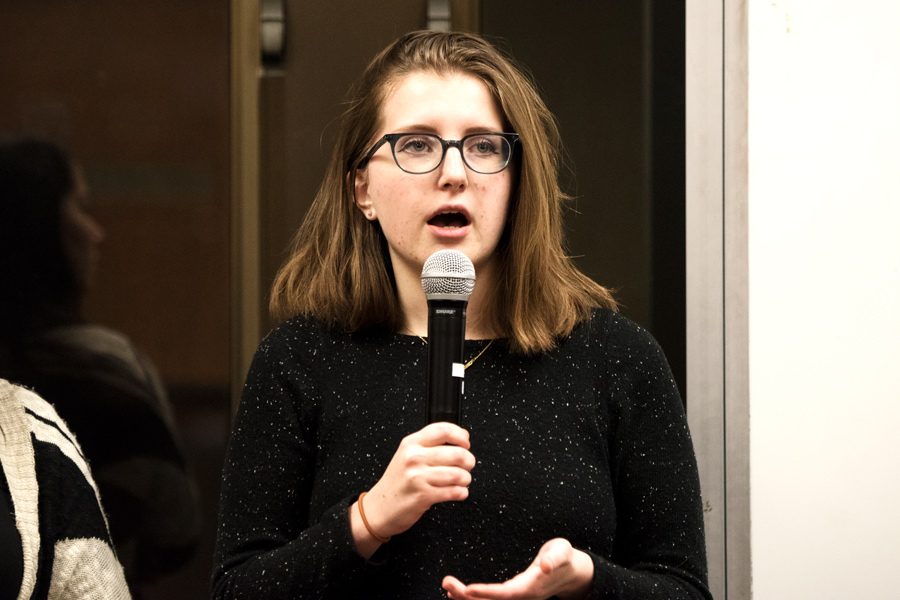ASG forms ad hoc committee to promote student wellness within student groups
Emily Ash speaks at an ASG senate meeting. Ash said the ad hoc committee will guide student groups in implementing wellness measures.
January 24, 2019
Associated Student Government unanimously passed legislation to create an ad hoc committee to research and make recommendations regarding student wellness within Northwestern student organizations during Wednesday’s Senate meeting.
The Ad Hoc Student Group Wellness Reform Committee will be led by Rebecca Lazer, the ASG vice president of health and wellness, and comprised of five senators who will be elected at next week’s ASG Senate meeting. The committee is set to publish its findings by mid-February.
“Student groups can do a lot to help people but it’s also important to realize how students may by harming each other,” Weinberg Senator Pragya Chandra said. “Having this committee can help wellness. It’s really important that we take care of each other.”
The legislation, which was introduced at the Jan. 16 ASG Senate meeting, comes just over a month after former ASG President Sky Patterson resigned from her position to focus on her wellbeing and academics.
Other colleges and legislatures are also grappling with the issues of mental health and wellness, particularly for students. A fall 2017 survey conducted by the American College Health Association (ACHA) found that 28.5 percent of U.S. college students had felt “overwhelming anxiety” in the last two weeks prior to the survey.
ASG previously attempted to improve student wellness three years ago through the creation of “wellness chairs” within student groups. However, the program failed to garner widespread implementation across student groups.
“The implementation of these rules has been very asymmetrical across groups and not particularly uniform,” ASG President Emily Ash said at the Jan. 16 senate meeting. “A lot of groups have fully ignored the mandate which has led us to question, ‘Why are we mandating this at all?’”
She added that ASG is forming the ad hoc committee to answer this question and others. The committee plans to conduct a broad investigation, soliciting input from student groups and individual students, which is why details of what the final recommendations may look like are still unclear.
“If you like the idea (of wellness chairs), vote yes,” Lazer said during debate of the legislation. “If you don’t like the idea of wellness chairs, also vote yes so you can make that perspective heard.”
A problem, Ash said, is that student groups lack basic knowledge about fostering wellness. Established cultural norms within the University, she continued, allow organizations to set “unhealthy expectations and standards of work.” Students often join a large number of organizations and commit substantial time to each one, Ash added.
ASG’s CARE training mandate, which requires student groups to receive training in supporting survivors of sexual assault and harassment is an example of how awareness and knowledge is crucial to changing cultural norms, Ash said. The wellness committee’s recommendations, Ash hopes, will have the same effect.
“I don’t foresee this task force putting forth guidelines that govern the number of hours or the number of organizations a student can commit themselves to,” Ash said, “but rather some practical guidance for how a student leader, as an individual or as an executive board decision-making body, can properly support their constituent members.”
Senators also passed a resolution to submit a comment to the federal register condemning the U.S. Education Department’s planned changes to Title IX.
At the end of the meeting, Parliamentarian Henry Molnar resigned from ASG, citing academic and personal reasons.
Email: [email protected]
Twitter: @jalan_atul
Related Stories:
Associated Student Government President Sky Patterson resigns
ASG-funded groups complete CARE training on sexual violence, positive sexuality


